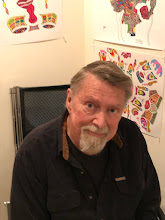.
I just read an article about the extent to which the “hashtag”, the symbol formerly known as the “number sign” or the “pound key” - “#”, has made it's way out of Twitter into the language at large. The rather long NY Times article asserts that the symbol has come to indicate a sort of ironic separation from the content following the #. I admit to not completely understanding - as I don't tweet. But apparently a # inserted before the content seems to have much the same linguistic function as "not" inserted behind the content. So, "#I completely agree" and "I completely agree . . . Not!" would be roughly equivalent statements.In the interest of full disclosure I must admit to a personal history of symbolic manipulation. It was probably sometime after 5th and 6th grade spent in Vienna, Austria, when I first encountered exotic symbol systems, but before college, when the odds of being outed as a poser would have been far greater. I used to take notes in class in fluid nonsense symbols. I would cover pages with intricate symbols - sometimes starting from the left, sometimes from the right. It was great fun. I would even cross out and make corrections. I think, perhaps, it was somehow tied up with masking ignorance as secret knowledge. And that, it seems, is a characteristic shared with the #. The symbol, the article implies, carries the flavor of shared, but assertive, indecision. A declaration of "I may not know what I'm talking about - but here is what I think anyhow!" It is a phase we all go through, and perhaps there is something hopeful in a generation with the courage to symbolically acknowledge, no matter how obliquely, their indecision or uncertainty.
Still, it worries me that there seems to be an increasingly positive connotation attached to imprecise expression. As I grow older, and more aware of how little of existence I understand, I try to express those few insights as clearly as possible. But perhaps there is an inverse linguistic relationship at play; as maturity seeks clarity, youth masks uncertainty with oblique prose.
A couple of examples, from opposite ends of the "complexity continuum." I mentioned several posts ago that I recently re-read The Great Gatsby. Although he had already written two previous novels, Fitzgerald was just turning 30 when he wrote Gatsby, and, had he not died so young, we would consider Gatsby one of his "early works." The point is that the prose is lovely, but the novel winds down to a whimpering "nobody loves me, everybody hates me, guess I'll go eat worms" concept. Youthful uncertainty wrapped in beautiful, complex, oblique prose.
Texting holds down the other end of the spectrum, well, more Twitter than texting. There are increasingly sophisticated speech-to-text software programs out there that by-pass tiny little keyboards to allow for less painful forays into texting. Some of them even get around the 160-character limits of SMS. Still, Twitter, increasingly the short-message platform of preference, for the nonce restricts messages to 140 characters. A restriction that, regular readers of my posts realize, might cause me to fling myself in front of a bus.
Still, younger writers seem to love it - because, I would argue, the enforced brevity lends itself to a sort of protective ambiguity. Doesn't demand it, mind you, but inclines one in that direction. Take for example, from another iconic platform of the young, Facebook, the relationship-status descriptor "It's complicated." What a superb example of terse ambiguity. It says nothing specific, but implies a world of possibilities. But a word of caution; the lack of precision does not always spin out in the protective way the author might intend. Two succinct phrases, one verifiable, the other probably mythic, serve as excellent examples of terse ambiguity gone awry: "I am not a crook!" and "Let them eat cake!" Neither leader spoke the phrase in an attempt to end a career. However, the intent of the speaker notwithstanding, the audiences apparently heard, "#I am not a crook!" and "#Let them eat cake!"
Did I do that right? #It will break my heart if I can't figure out how to use the #.
.

No comments:
Post a Comment